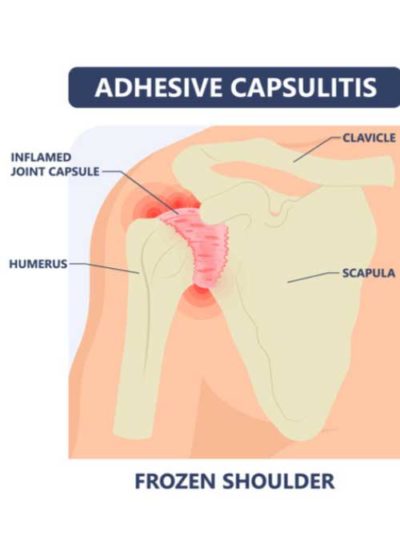Frozen Shoulder Doctor

Are you experiencing a stiff shoulder or are you unable to lift your arm above shoulder-height? If so, you may be suffering from a condition known as adhesive capsulitis, also known as frozen shoulder. Frozen shoulder typically affects patients between the ages of 40 and 60 years, and females are much more likely to develop this condition than males. Frozen shoulder specialist, Doctor Riley J. Williams provides diagnosis as well as surgical and nonsurgical treatment options for patients in Manhattan, Brooklyn, New York City and surrounding areas who are experiencing the symptoms of a frozen shoulder. Contact Dr. Williams’ team today!
What is a frozen shoulder?
Frozen shoulder, also known as adhesive capsulitis, is a condition that causes severe shoulder pain and motion loss in affected individuals. Frozen shoulder develops from the thickening and tightening of the connective tissue surrounding the shoulder joint in response to inflammation. This thickening creates scar tissue, or “adhesions”, that cause symptoms of pain and stiffness; these adhesions also contribute the observed loss of shoulder and arm movement. The symptoms of a frozen shoulder develop and worsen gradually over time; there is usually no preceding trauma to the onset of symptoms. In some cases, there is a complete loss of shoulder function making simple daily tasks difficult and painful. Dr. Riley J. Williams, orthopedic shoulder specialist serving patients in Manhattan, Brooklyn, New York City, NY and surrounding areas, has the knowledge and understanding, as well as substantial experience in treating patients who have experienced a frozen shoulder.
What causes a frozen shoulder?
The causes of adhesive capsulitis are not fully understood. There are some underlying health conditions that can increase a patient’s risk for developing a frozen shoulder. These include:
- Diabetes: Frozen shoulder symptoms in diabetic patients are typically more severe and continue for a longer period of time.
- Female sex: More females have frozen shoulder than their male counterparts
- Age over 40: Most often seen between ages 40-60
- Immobility: When the shoulder is not moved for an extended period of time, usually as a result of a prior injury, can contribute to symptoms of a frozen shoulder.
- Other underlying health conditions: have also been linked to the development of frozen shoulder, including:
- Tuberculosis
- Parkinson’s Disease
- Cardiac Disease
- Stroke
- Thyroid disorders
What are the stages of a frozen shoulder?
Adhesive capsulitis develops gradually in three different stages:
Inflammation: This initial stage is characterized by pain. Motion loss remains but the joint is constantly achy and painful. Sleeping is difficult.
Freezing: During this stage, symptoms of pain increase and motion loss ensues.
Frozen: Patients experience dramatic motion loss, but most of the inflammation has subsided.
Thawing: During this stage, range of motion of the shoulder improves and most patients return to normal shoulder function. Some patients still notices some mild loss of shoulder motion after a full recovery.
The total time to move through the stages varies, but it can take 2-3 years to recover from adhesive capsulitis without treatment.
What are the symptoms of a frozen shoulder?
Frozen shoulder symptoms develop gradually and worsen over time. It is common for these symptoms to resolve on their own within a few years of onset. Common complaints include:
- A dull ache that worsens with arm movement
- Decreased shoulder strength and range of motion
- Shoulder joint stiffness accompanied by pain
- Inability to lift the arm above the shoulder
- Difficulty sleeping
How is a frozen shoulder diagnosed?
Dr. Williams can diagnose a frozen shoulder with a comprehensive medical history and physical examination. The physical examination will focus on areas of pain, range of motion, and limited mobility. Diagnostic imaging, including x-rays and magnetic resonance imaging (MRI), may be needed to identify damage to any other structures within the shoulder.
What is the treatment for a frozen shoulder?
Non-surgical treatment:
Patients diagnosed with a frozen shoulder can recover with conservative therapy. Non-steroidal anti-inflammatory medications reduce the pain and inflammation associated with this condition and are a mainstay of treatment. Icing, physical therapy and corticosteroid injection are also used in patients with frozen shoulder.
Surgical treatment:
If conservative therapy is unsuccessful at resolving a frozen shoulder, Dr. Williams may recommend a shoulder arthroscopy, a minimally invasive surgical procedure using a small camera to view the muscles and tendons of the shoulder. Dr. Williams usually performs a “capsular release” or “lysis of adhesions” procedure to release the offending scar tissue that limits motion in these patients. The shoulder is also manipulated while the patient is asleep to restore full arm range of motion. Performing this procedure arthroscopically allows for a more controlled and precise release of the shoulder capsule. The small incisions utilized with the arthroscopic approach allows a faster recovery period as patients begin physical therapy immediately following surgery.
For more information on frozen shoulder, adhesive capsulitis, or the excellent treatment options available, please contact the office of Dr. Riley J. Williams, orthopedic shoulder specialist serving Manhattan, Brooklyn, New York City, NY and surrounding areas.

